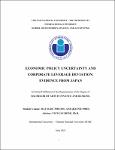| dc.description.abstract | Japan’s corporate governance framework and regulations show
how it distinguishes itself from other nations. Using a sample of 40,325 firmyear observations of firms listed on the Tokyo Stock Exchange during the
period 1999-2021, this study analyzes the impact of economic policy
uncertainty on the leverage deviation from target. The empirical results show
an adverse relation between leverage deviation and economic policy
uncertainty in Japan. Additional analysis reveals that business risk and
financial constraints are this relationship's transmission channels. However,
the effect of EPU on firms' leverage deviation is lessened thanks to the
presence of business groups (keiretsu) and a high amount of tangible assets. | en_US |


